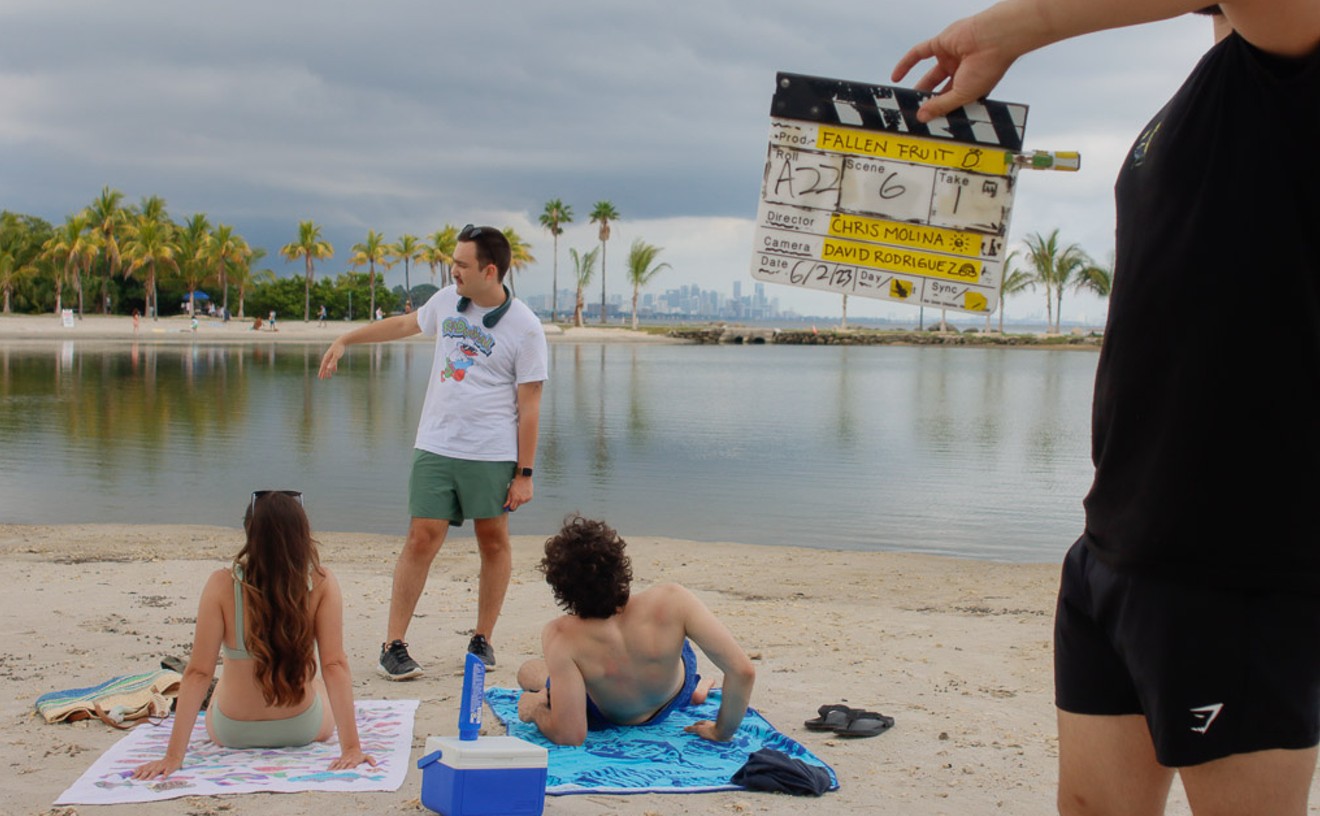Surely, there are features which distinguish Latin writers -- a greater reliance on incorporating mood, dance, and music into the dramatic for one, and a greater in-your-face exhibition of both passion and agony. Whereas Anglos favor verbal twists and taunts to carry electricity, Hispanic theater uses constant movement and emotional challenge more often than just dialogue. Still, the various companies represented by the festival concern themselves with largely divergent issues, presenting plays that range from brilliant to boring, the mundane to the cosmic, the explosive to the numbingly pedantic.
Featuring productions from eleven different countries, this massive undertaking by Festival Director Mario Ernesto Sanchez (of Teatro Avante) was largely underwritten by United Airlines, credited with flying many thespian bodies to two different stages: El Carrusel Theatre and the Minorca Playhouse. First I'd like to offer a word about these venues, which provide uneven housing. The Minorca continues to be one of the best small spaces in the area for viewing drama; El Carrusel, on the other hand, which served as a children's theater and, more appropriately, a movie house (the Cinematheque), detracts from the willing suspension of disbelief. With a claustrophobically low ceiling and an ultrahigh and long stage, sight lines and acoustics suffer mightily.
Having said that, the showpiece from the first week played in the poorer house and still managed to combine poetry with pain, drama with dance, and a universal message of displacement with a very particular view of life in a country beset by terrorism. Adios, Ayacucho, presented by the Peruvian group Yuyachkani (a Quechua word that means "I am thinking, I am remembering"), is based on an alternately chilling and touching short story by Julio Ortega. When Alfonso Canepa, the peasant protagonist, wriggles from a large trash bag to encounter a slab bearing his clothing, the mood -- complete with funereal candles -- cannot be mistaken. Employing the able help of a musician unobtrusively playing various traditional instruments, Canepa tells of his journey from the mountains down to Lima in search of his dispersed body parts. As he tries to find peace by piecing together his own identity -- literally and figuratively --
he encounters numerous citizens along he way and incorporates each into a united spirit.
Since Canepa takes a sometimes cynical, sometimes flip attitude toward this macabre search, the piece contains both wry humor and potent politics. As directed by Miguel Rubio, the wandering spirit stays in motion, performing impressive physical feats and conveying the urgency of the soul's mission. Augusto Casafranca as Canepa kidnaps the eye and heart from the beginning and never lets go, while the subtle sounds of Debora Correa underscore and enhance each changing mood.
Along the same lines of theatrical bravery, Spain's La Zaranda examined how the past intrudes upon present thought in the very Beckett-like Perdonen La Tristeza. On a stage cluttered with trunks, picture frames, and rope, three clownlike workers sort through memories in an attempt to understand life. But everything they find turns to dust, and so they must ground themselves in reality by repeating ritualistic motions and sentences, such as, "Nothing can be done." Meant to represent man always out of phase with time, living without meaning, this disturbing piece both confounds and amuses, but also becomes too contrived in its persistently hollow vision.
Nevertheless, both the Spanish and Peruvian companies -- who have been honored throughout the world -- deserve credit for tackling innovative and highly literary work without losing the urgency of live theater.
At the other extreme, the warm but corny La Carreta by Rene Marques -- considered one of Puerto Rico's most noted playwrights -- represents the ultimate movie of the week from San Juan. As performed by New York's Puerto Rican Traveling Theatre, the three very long acts contain all the laughter, heartbreak, tragedy, and lurid events of, say, Scruples. Tracing the journey of a family from an impoverished rural district outside the capital to the infamous barrio of San Juan -- ironically dubbed La Perla (The Pearl) -- finally to the slums of the Bronx, predictable transitions take place. The sweet young daughter Juanita, naive in the country, raped in La Perla, becomes a woman for hire in New York. The head of the family, Luis, enamored of progress and the search for yuppiedom, drags his loved ones and his own spirit through the mire of unemployment, prejudice, and danger, described by his sister in the final act as "gente que vive que mejor estan muerta" ("living people who are better off dead").
Although considered by many the ultimate portrayal of the Puerto Rican experience, the play's predictable and dated nature prevents it from transcending soap opera. Notable among the cast is George Bass as the wise abuelo, Don Chago, and Esther Mari as Dona Gabriela, the ultimate mother figure, whose heart cracks bit by bit with each new blow to her family. Noticeably off-kilter is Victor Sierra as youngest son Chaguito, whose comic sense appears welded to a bad imitation of Harpo Marx.
Someplace between theatrical experiment and scientology lecture, the annoying El Juego Que Todos Jugamos, from Teatro Producciones Candilejas of Guatemala, demands immediate love and attention from the audience. Sounding the repetitive order of "cambio!" ("change!"), this work by Chilean playwright/filmmaker Alejandro Jodorowsky (of the shocking Santa Sangre) begins with pseudo-inspirational Saturday Night Live skits, (such as how a star's ego reflects public opinion) and ends with director and cast confronting the audience in mucho ado about nothing. Icky bits such as the call for caricias (caresses) -- both on-stage and off -- and confessions from the actors about how this inspiring piece changed their lives, did about as much for me as the sermons of Jim and Tammy Faye Bakker. When asked at the end to kiss the actors instead of applauding, all I could muster was a handshake -- and a fairly limp one at that.
The festival began on the strong point of Cuban playwright Julio Matas's world premiere, El Extravio/Deviations (reviewed last week); it continues with plays concerning women, followed by both a Brazilian and Russian group tackling Federico Garcia Lorca (to be discussed next week). In between, everything but the kitchen sink -- but not excluding kitchen sink drama -- showed up on-stage, proving that Latin theater, like any other type, has both high and low terrains.










